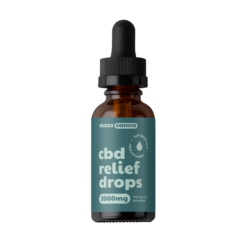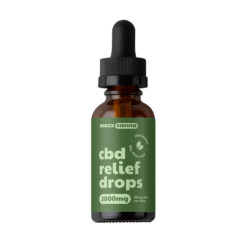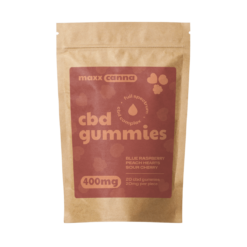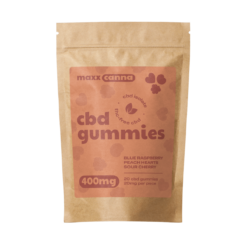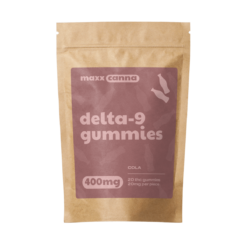Understanding What CBG and CBD Are?
It is necessary to research each compound separately to understand the differences between CBG vs CBD.
What is CBG?
Cannabigerol (CBG) is present in smaller amounts in the cannabis plant. It is a precursor to THC and CBD, two other cannabinoids. The therapeutic advantages, which include antibacterial, anti-inflammatory, and neuroprotective properties, have drawn attention.
What is CBD?
The non-psychoactive part of CBD (cannabidiol). The body’s endocannabinoid system, which regulates physiological processes, interacts with CBD. It has grown in popularity because of its potential benefits, like pain management, anxiety reduction, and the promotion of general well-being.
Exploring Benefits and Uses of CBD and CBG

CBD Benefits
CBD, due to its versatility, has a wide range of possible benefits:
- CBD for Inflammation
Because of its anti-inflammatory properties, CBD has grown in popularity. CBD may relieve people with inflammatory disorders by reducing inflammation by interacting with the body’s endocannabinoid system and other pathways.
- CBD for Mood Enhancement
Research suggests that CBD may alter mood by interacting with brain receptors. CBD has shown promise for creating a pleasant attitude and reducing symptoms linked with mood disorders by affecting neurotransmitter function.
- CBD for Skin Health
CBD topical treatments have grown in popularity due to their potential skin benefits. CBD’s anti-inflammatory and antioxidant characteristics help to healthier skin, perhaps benefiting in managing various skin diseases.
- CBD for Neurological condition
CBD has caught the interest of researchers because of its possible therapeutic benefits on neurological diseases such as epilepsy. CBD oil has been found in studies to help reduce seizure frequency and enhance the quality of life for those with epilepsy.
- CBD for Digestive Health
CBD may affect the digestive system by modifying gut function and lowering inflammation. Individuals suffering from stomach issues and pain may benefit from this.
CBG Benefits
CBG has shown potential in a variety of areas, including:
- CBG for Pain Reduction
According to scientific evidence, CBG interacts with pain receptors in the body, potentially offering pain relief. While further study is needed to completely understand its actions, preliminary data suggest that CBG has the potential to be a natural pain reliever providing a potential option for persons seeking pain relief.
- CBG for Anxiety
The anxiolytic properties of CBG make it an ally for managing stress and anxiety. By influencing serotonin receptors, CBG can induce a state of calmness and relaxation in the brain, aiding people in addressing anxiety-related issues.
- CBG for Sleep
CBG is a good option for improving sleep quality because of its calming properties. CBG enhances relaxation and has the power to reduce anxiety. It is helpful for people who have trouble sleeping because it creates the ideal environment for restful sleep.
- CBG for Neuroprotection
Study reveals that CBG may have neuroprotective properties. CBG offers promise in neuroprotection, delivering potential advantages for disorders affecting the brain by maintaining the health of neurons and the general functioning of the nervous system.
CBG vs CBD -Differences and Comparisons
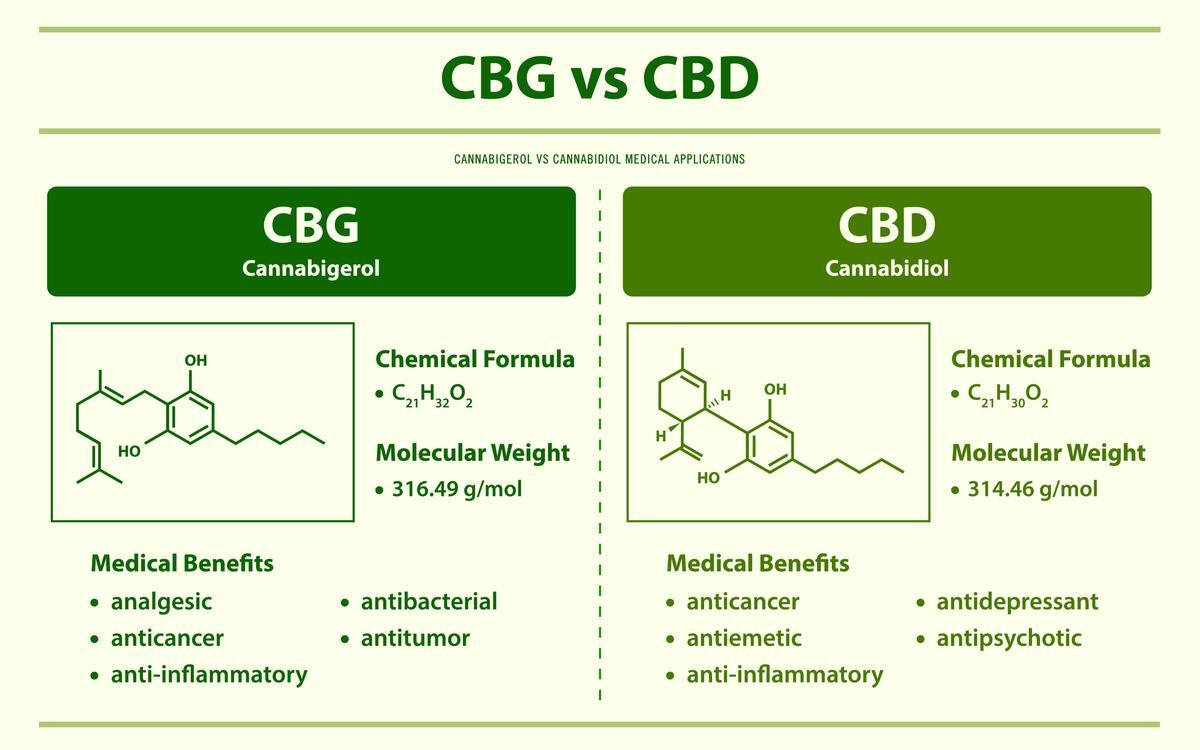
When comparing CBG vs CBD, it’s essential to understand their distinct properties. Both compounds are produced from the cannabis plant, yet they have quite different properties:
- CBG, often known as the “stem cell” of cannabinoids, is a precursor to other compounds such as CBD and THC. It is, however, present at lower concentrations than CBD. While CBG is essential for creating other cannabinoids, its presence in cannabis plants is minimal.
- CBD works with the body’s endocannabinoid receptors directly to change the activity of neurotransmitters and affects the physiological processes. Because of this, CBD can have various effects on the body.
By understanding these distinctions, individuals can make informed decisions about the contrasting properties of CBG and CBD.
Legal Considerations and Availability
The legal status and availability of CBD and CBG products might vary.
Legal Considerations and Availability of CBG in Canada:
CBG is not as commonly available in Canada as CBD. CBG can be extracted from particular cannabis strains. However, its concentration in plants is usually low. Finding CBG-specific products may be more complex than finding CBD-specific products.
CBD Legal Considerations and Availability in Canada:
CBD extracted from hemp, on the other hand, is legal in Canada and has less than 0.3% THC. CBD products are widely available, with an extensive selection of options. CBD oils, pills, topicals, and even edibles are available nationwide at dispensaries, online shops, and wellness stores.
CBG and CBD – Potential Side Effects
CBG and CBD are usually well tolerated, and it is necessary to be aware of the possibility of minor side effects.
CBG
The adverse effects of CBG have been reported to be minor. After consuming CBG, some people may develop dry mouth or sleepiness. However, further study is needed to acquire a complete knowledge of CBG’s safety profile and potential adverse effects.
CBD
CBD may cause minor adverse effects. Changes in appetite, fatigue, and diarrhea are a few symptoms. Contact a medical professional before introducing CBD into your daily routine.
CBG and CBD Dosage Guidelines
The correct dose must be decided to attain the best outcomes and reap the most advantages from CBG vs CBD products. Several criteria, including body weight, individual tolerance, and intended effects, determine the ideal amount.
Consider the following factors:
Body Weight: The recommended dose is determined by body weight. Generally, individuals with a more significant body weight may require higher dosages to get the desired results. It is best to begin with a lesser dose and gradually increase it if necessary.
Individual Tolerance: Everyone reacts differently to CBG and CBD. It is essential to be aware of your tolerance levels. Begin with a smaller dose and monitor how your body responds. Adamount the amount to get the desired outcomes avoiding adverse side effects.
Desired Effects: The dose might also be influenced by the desired effects. A lesser quantity, for example, may be appropriate if you’re using CBG or CBD for modest pain treatment or overall well-being. If, on the other hand, you’re targeting more specific concerns like chronic pain or severe anxiety, a higher dose may be required.
Dosage Recommendations:
Begin low: It is best to start with a modest dose, often 5-10 mg of CBG or CBD, and monitor the effects over a few days. If the intended results are not obtained, slowly increase the dose by 5 mg until you discover your ideal dosage.
Consider Product Potency: The potency of various CBG and CBD products varies. Take note of the CBG or CBD concentration per serving, generally listed on the product label. To account for the strength of the substance, adjust the dose appropriately.
Consult a Healthcare expert: If you’re confused about the proper dosage or have particular health issues, it’s best to speak with a healthcare expert or qualified CBD specialist.
How CBD and CBG Interact with the Endocannabinoid System
CBG and CBD interact differently with the endocannabinoid system, affecting various physiological processes. These interactions assist in explaining why CBG and CBD have other effects:
CBD
CBD interacts directly with the endocannabinoid system. It binds to CB1 and CB2 receptors found all over the body, including the central nervous system and immunological cells. CBD regulates neurotransmitter release and modifies biological processes such as pain perception, inflammation, and immunological response.
CBG
The interaction with the endocannabinoid system is indirect but significant. It affects the production and actions of other cannabinoids, including CBD and THC. CBG may contribute to health effects by regulating the availability of these cannabinoids. Because it influences the endocannabinoid system, CBG has a varied impact on our well-being.
The distinct effects of CBD and CBG on the body are due to their varied interaction mechanisms with the endocannabinoid system. While CBG has an indirect impact on cannabinoid production and activity, CBD interacts directly with particular receptors to control a variety of physiological processes.
Conclusion
In conclusion, before deciding, it is essential to thoroughly analyze the possible benefits and contrasts between CBG and CBD. CBG meets individual requirements by providing benefits such as pain reduction, anxiety control, and improved sleep. CBD, on the other hand, has a more excellent range of uses. Getting assistance from healthcare specialists who can give personalized advice is recommended to ensure you make the best decision. You may make an informed choice about whether CBG or CBD is appropriate for you by considering individual needs and professional suggestions.

